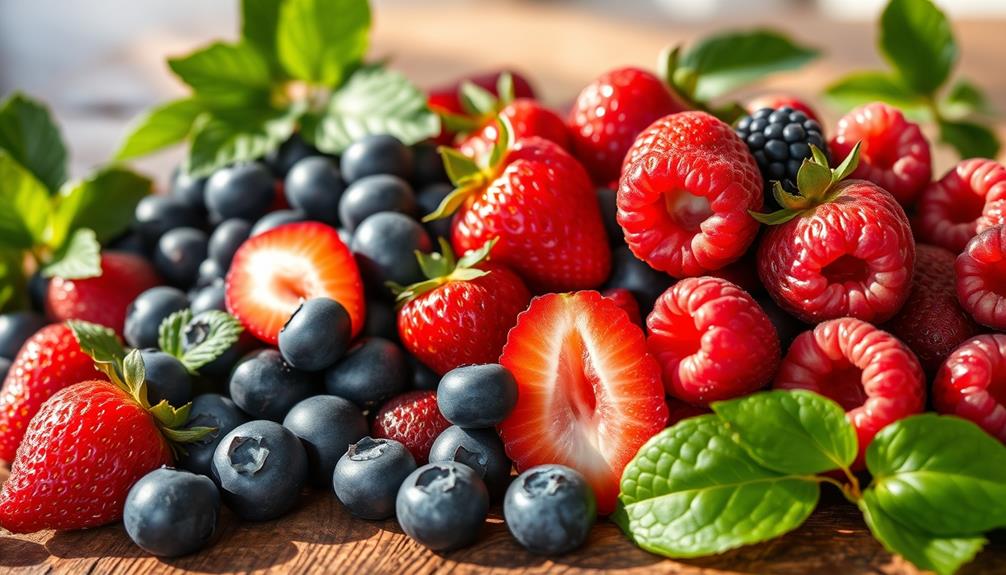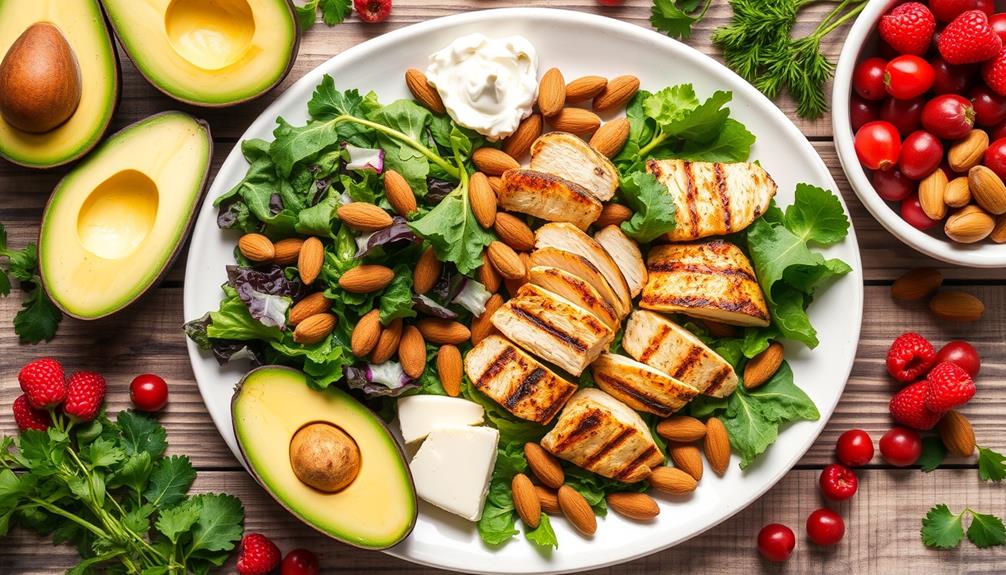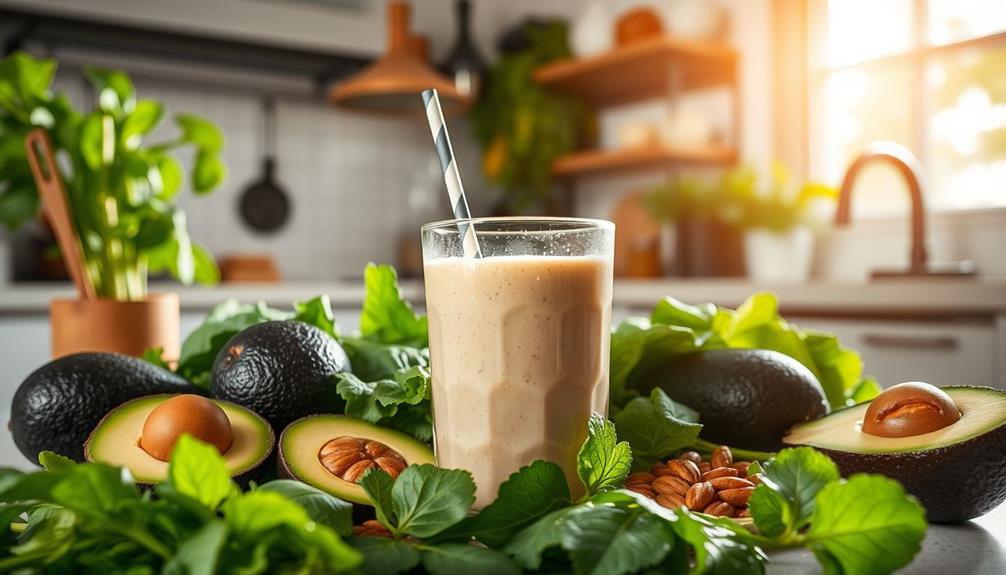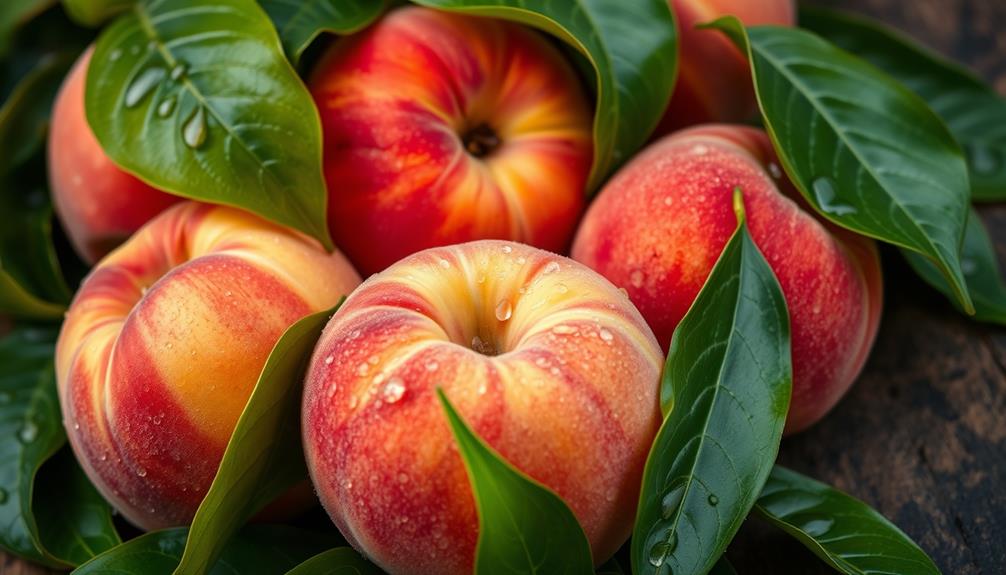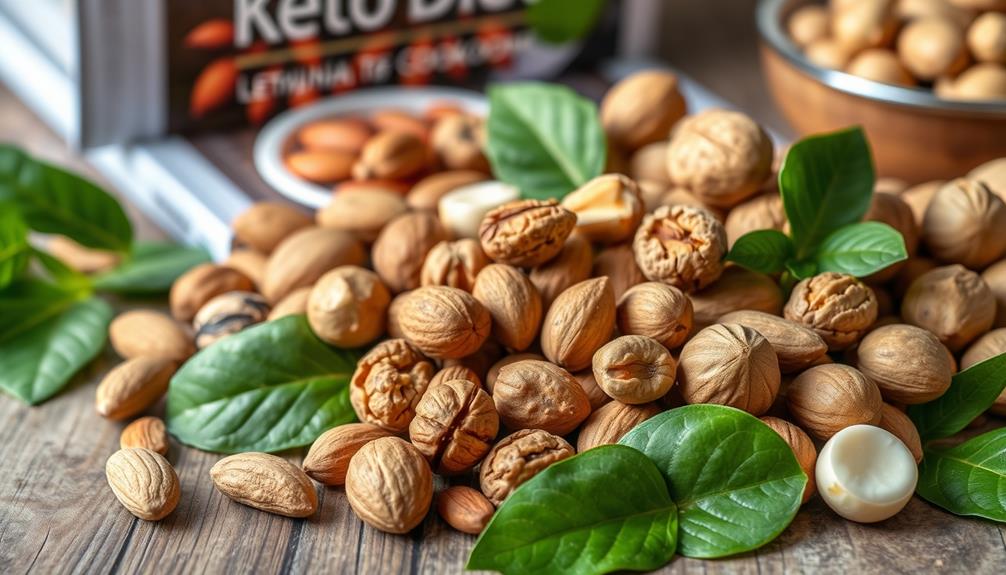When you're on a keto diet, the best fruits to enjoy are avocados and berries. Avocados are packed with healthy fats and have only 1.5 grams of net carbs per half a fruit. Berries like raspberries, blackberries, and strawberries are also great choices, with net carbs ranging from 5 to 8.7 grams per serving. Lemons can be used for flavor without adding too many carbs. Just remember to keep an eye on portion sizes to stay within your daily carb limit. If you want to discover more options and tips for incorporating fruit into your keto plan, there's plenty more to explore! Other low carb fruits to consider are coconut, olives, and tomatoes, all of which can add variety and flavor to your keto diet. These fruits have lower net carb counts compared to other options, making them great choices for those looking to maintain ketosis. Experimenting with different low carb fruits can help keep your meals interesting and satisfying while sticking to your dietary goals.
Key Takeaways
- Avocados are ideal for keto due to their low net carbs (1.5g) and high healthy fat content.
- Berries like blackberries and raspberries provide antioxidants and fiber, making them excellent low-carb fruit choices.
- Lemons can enhance flavors while adding only 4g net carbs, supporting hydration and digestion.
- Watermelon, with 11.5g net carbs per cup, is hydrating and nutritious while remaining within keto limits.
- Portion control is essential; stick to 1/4 to 1/2 cup of berries to maintain daily carb limits.
Overview of the Keto Diet
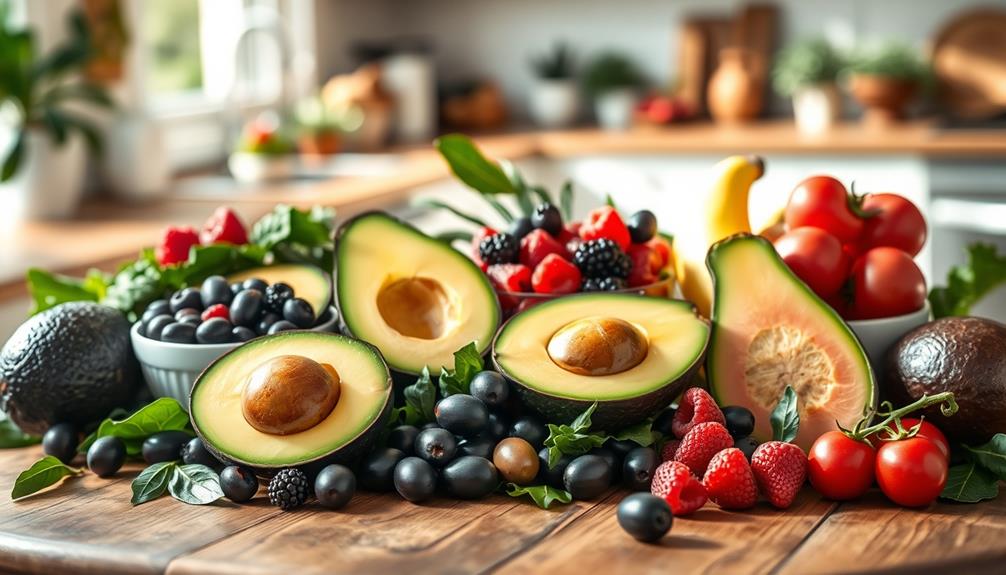
Understanding the keto diet starts with recognizing its core principle: drastically reducing carbohydrate intake to shift your body into a state of ketosis. By limiting yourself to about 20-50 grams of carbs per day, your body begins burning fat for fuel instead of carbohydrates. This metabolic shift can lead to significant weight loss and various health benefits.
Incorporating keto-friendly fruits into your diet can help maintain nutrient levels while adhering to low carb limits.
A typical macronutrient distribution on the keto diet consists of approximately 70-80% of your total calories from fat, 10-20% from protein, and only 5-10% from carbohydrates. This low-carb diet has historical roots dating back to the 19th century, originally used for weight loss and managing conditions like diabetes, epilepsy, and even Alzheimer's disease.
Transitioning to the keto diet may come with some challenges, such as "keto flu," which can cause fatigue, irritability, and headaches as your body adapts.
It's crucial to monitor your nutrient intake carefully to prevent deficiencies that can arise from such restrictive eating patterns. Embracing keto-friendly fruits can be a part of your journey, as they provide essential nutrients while keeping your net carbs low.
Low-Carb Fruits to Enjoy
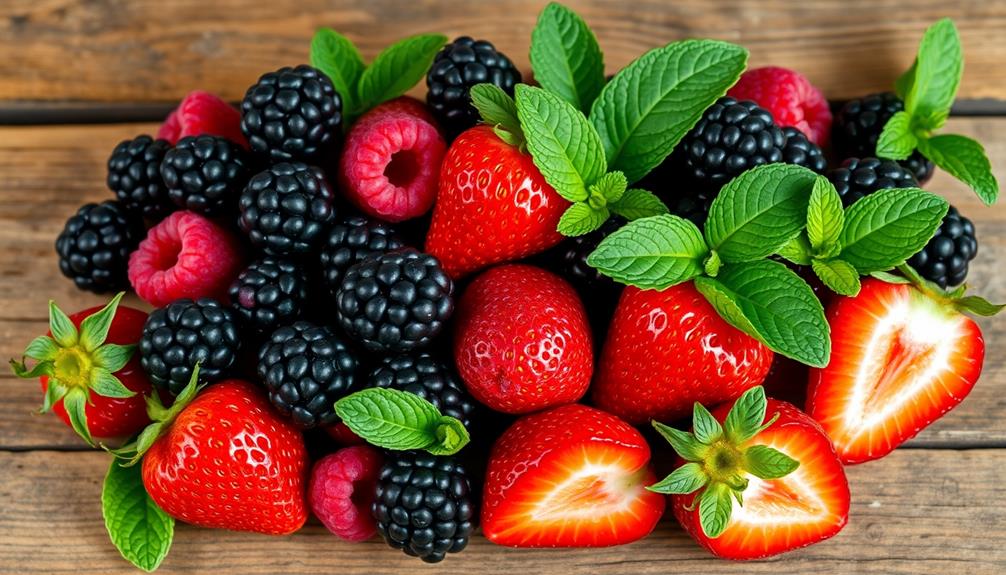
When following a keto diet, finding fruits that fit your low-carb lifestyle can be challenging but rewarding. Here's a list of some keto-friendly fruits to enjoy, all low in calories and perfect for your diet food list.
| Fruit | Net Carbs (per 100g) | Benefits |
|---|---|---|
| Avocado | 8.5g | High in healthy fats |
| Blackberries | 5g | Rich in fiber |
| Strawberries | 8.7g | High in vitamin C |
| Lemons | 4g | Flavor enhancer, low-carb |
| Raspberries | 7g | Packed with antioxidants |
Avocados are a fantastic choice with their healthy fats and just 8.5 grams of carbs. Blackberries come in at only 5 grams of net carbs and are high in fiber, aiding digestion. Strawberries not only provide 8.7 grams of net carbs but are also a great source of vitamin C. Lemons are a flavorful addition with only 4 grams of net carbs, and raspberries offer 7 grams while being rich in antioxidants. Incorporating these fruits into your meals can support weight loss while satisfying your sweet tooth!
Nutritional Benefits of Keto Fruits
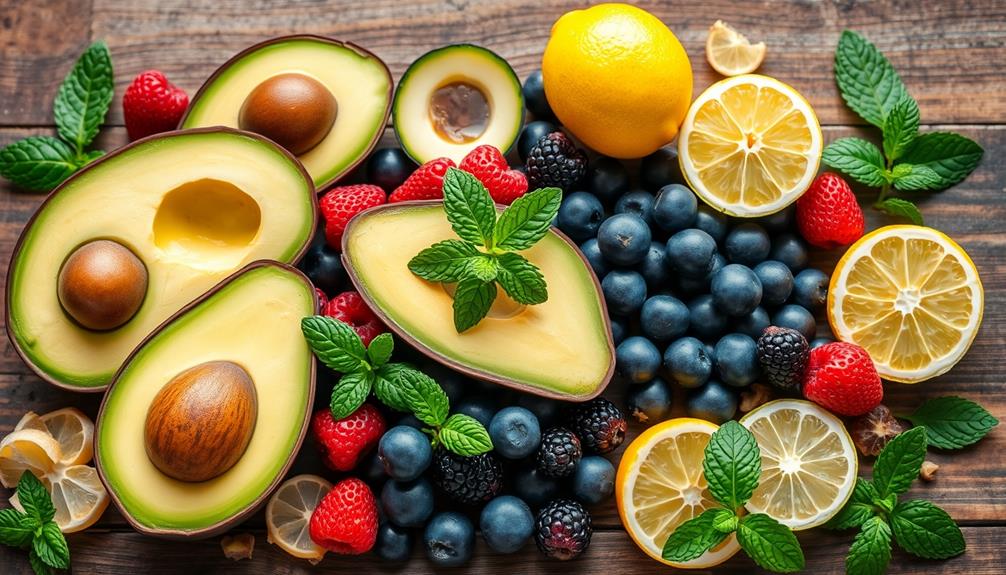
Keto fruits offer an array of nutritional benefits that can enhance your diet while keeping your carb intake low. With their low net carbs and high fiber content, these fruits support your health goals without compromising your keto-friendly lifestyle.
Incorporating fruits like these can also complement other dietary considerations, such as managing inflammation natural remedies alongside conventional medications. Here are three standout options:
- Avocados – Packed with healthy fats, avocados provide just 1.5 grams of net carbs per 100 grams, making them a creamy, nutritious choice.
- Berries – Low in net carbs and high in fiber, berries like raspberries and blackberries are excellent for boosting your antioxidant intake and satisfying your sweet cravings.
- Lemons – With only 6 grams of net carbs per 100 grams, lemons are high in vitamin C, offering immune support and adding zesty flavor to your meals.
Incorporating these fruits into your diet can also promote heart health and improve hydration.
Watermelon, for instance, is invigorating and provides essential nutrients, while tomatoes contribute to your antioxidant intake.
Fruits to Avoid on Keto
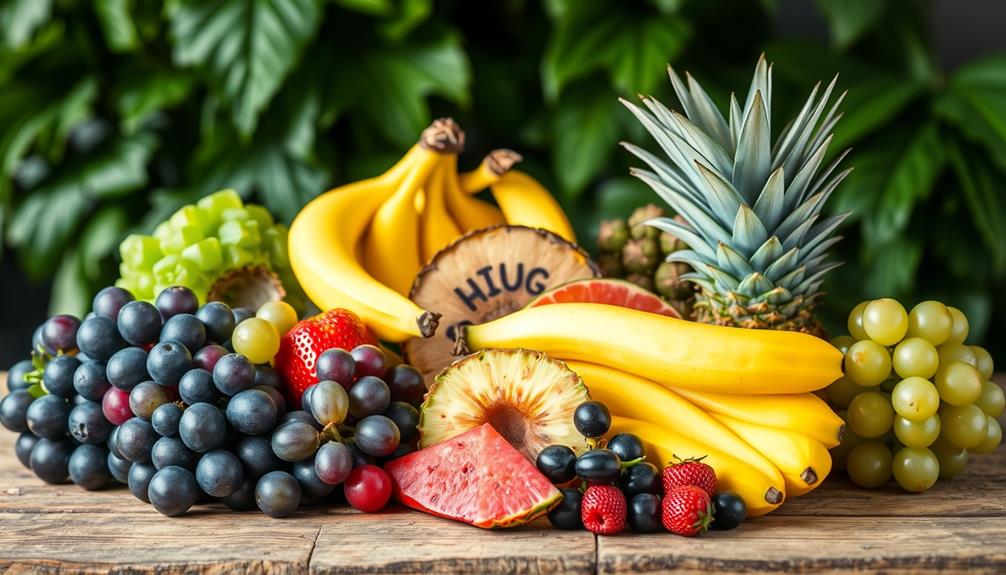
Maintaining a successful ketogenic diet means being mindful of the fruits you choose, as many popular options are packed with carbs. Incorporating effective strategies for weight loss can help you stay on track while enjoying the benefits of a keto lifestyle.
There are certain high-carb fruits that you should avoid to keep your body in ketosis and support your weight loss efforts.
First on the list are apples, which contain about 15 grams of net carbs for a medium-sized fruit. Grapes are also a poor choice, with roughly 16 grams of net carbs per cup, making it easy to exceed your daily carb limit.
Cherries should be avoided too, as they provide around 12 grams of net carbs per cup, potentially disrupting ketosis if you consume them in larger quantities.
Pineapples are another fruit to steer clear of due to their high glycemic index and approximately 19 grams of net carbs per cup, which can spike blood sugar levels.
Finally, bananas, although delicious, pack around 20 grams of net carbs per medium fruit, making them unsuitable for your ketogenic diet.
Popular Keto-Friendly Fruits
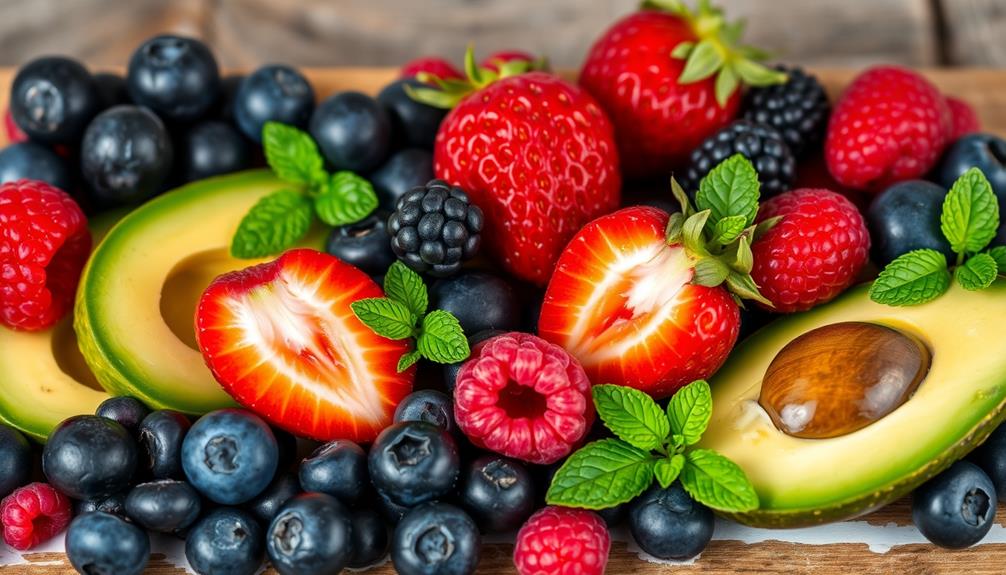
While it's important to know which fruits to avoid on a ketogenic diet, there are plenty of delicious options that fit perfectly within your carb limits. By understanding the nutritional profiles of these fruits, you can make informed choices that enhance your meals and support your health goals.
Here are some popular keto-friendly fruits you can enjoy:
1. Avocados: With only 8.5 grams of total carbs and 7 grams of fiber per 100 grams, avocados offer just 1.5 grams of net carbs. They're rich in healthy fats and essential nutrients, making them a staple for any keto meal.
Additionally, avocados can enhance the flavor of your favorite coffee beverages, providing a creamy texture without adding excessive carbs, which can be a delightful twist for coffee lovers.
2. Raspberries: These luscious berries provide approximately 15 grams of total carbs and 8 grams of fiber per cup, resulting in 7 grams of net carbs. Plus, they're loaded with antioxidants and vitamin C, giving you a nutritious boost.
3. Blackberries: Offering about 11 grams of total carbs and 6 grams of fiber per 100 grams, blackberries have just 5 grams of net carbs. They're also a fantastic source of vitamins C and K, making them another excellent choice.
Adding these fruits to your diet can help you satisfy your sweet cravings while keeping your carb intake in check. Enjoy the benefits of these keto-friendly fruits!
Health Benefits of Specific Fruits
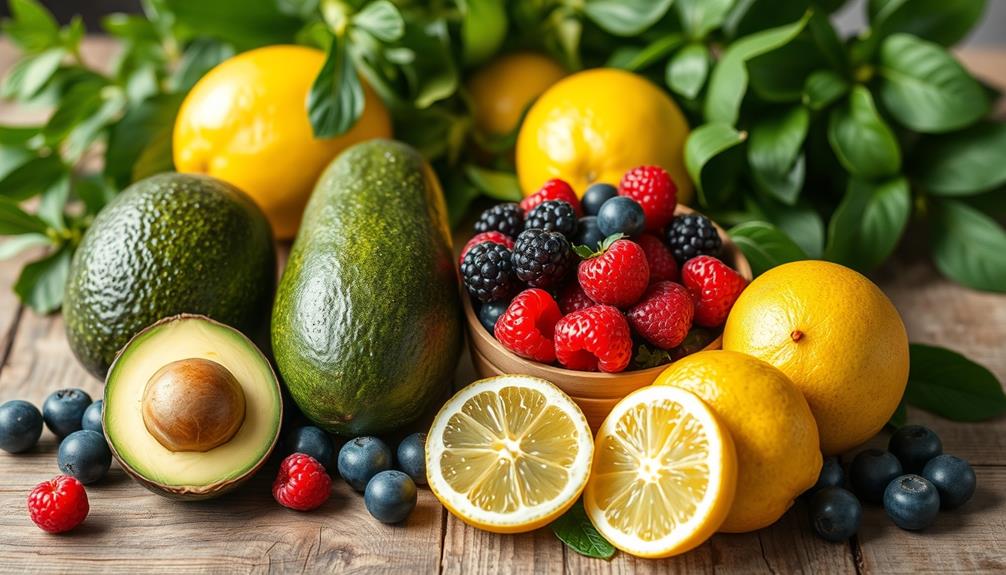
Fruits like avocados, raspberries, and strawberries not only satisfy your sweet tooth but also offer a range of health benefits that support your wellness journey. Incorporating these fruits into your diet can also aid in maintaining a healthy budget, as fresh produce often provides essential nutrients at a lower cost compared to processed snacks a budget-friendly option.
Avocados are rich in healthy monounsaturated fats, providing about 8.5 grams of carbs and 14.7 grams of fat per 100 grams. These nutrients enhance heart health and help you feel full on a ketogenic diet.
Raspberries, with only 7 grams of net carbs per cup, are high in antioxidants that may help reduce inflammation and lower the risk of chronic diseases.
Strawberries offer about 8.7 grams of net carbs and are loaded with vitamin C, supporting your immune function and overall health.
You can also enjoy lemons, which are low in carbs with around 6 grams per fruit, while providing a revitalizing dose of vitamin C that aids in hydration and digestion.
Watermelon is another delightful option, boasting about 11.5 grams of net carbs per cup. This hydrating fruit contains beneficial compounds like lycopene, which may promote heart health.
Including these fruits in your diet not only keeps your carb count low but also boosts your wellness with their unique health benefits.
Portion Control and Serving Sizes
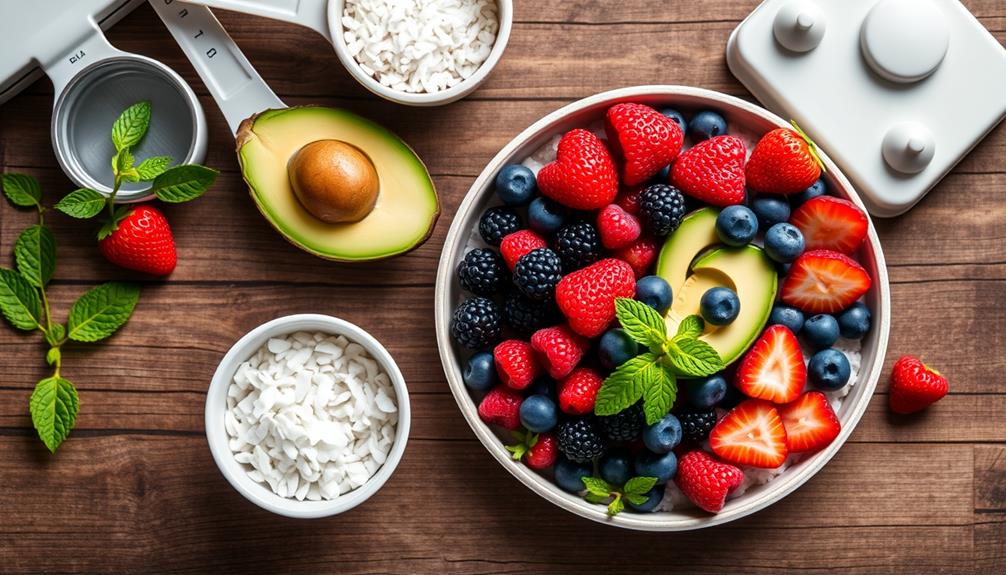
When it comes to adhering to a ketogenic diet, keeping an eye on portion sizes is essential for success. Even fruits that are low in net carbs can add up quickly if you're not careful.
Here are three fruits you should monitor portion sizes for:
- Raspberries: Stick to about 1 cup, which contains approximately 7 grams of net carbs.
- Strawberries: A 1-cup serving has about 8.7 grams of net carbs, so be cautious.
- Avocado: Enjoy ½ an avocado, providing only 1.5 grams of net carbs, making it a healthy keto option.
To maintain your daily carb intake, it's vital to know the grams of carbs per serving size.
Keep in mind that even a 1-cup serving of watermelon has around 11.5 grams of net carbs, so consider eating it sparingly.
Additionally, be wary of fruit blends; a mixed serving can quickly exceed your recommended daily carb limit of about 25 grams.
Practical Tips for Including Fruits

When you're looking to include fruits in your keto diet, focus on low-carb options like berries and avocados for a healthy boost.
Keep an eye on portion sizes—sticking to 1/4 to 1/2 cup for berries can help you stay within your carb limits.
Pairing these fruits with high-fat options can create tasty snacks that fit perfectly into your meal plan.
Portion Control Strategies
Incorporating fruits into your keto diet can be enjoyable and manageable if you implement effective portion control strategies. To keep your net carbs in check while still enjoying some delicious fruit, consider these tips:
- Measure your servings: Use measuring cups or a food scale to guarantee your fruit portions are accurate. Aim for 1/4 to 1/2 cup of berries like raspberries or blackberries, which are low in carbs but high in fiber.
- Pair wisely: Combine small amounts of whole fruits with high-fat foods. For example, enjoy a few strawberries with whipped cream or yogurt. This not only balances the carb content but also enhances flavor and satiety.
- Track your intake: Keep a food diary or use an app to monitor your total daily carb intake. By staying aware of your carb allowance, typically around 25 grams, you can adjust fruit portions as needed to meet your ketogenic goals.
Low-Carb Fruit Options
Fruits can be a delightful addition to your keto diet, especially when you focus on low-carb options that fit within your daily limits. Incorporating low-carb fruits can help satisfy your cravings without exceeding your net carb goals.
Avocados stand out as an excellent choice, offering only 8.5 grams of carbs per 100 grams, along with healthy fats and fiber.
Berries, including raspberries, blackberries, and strawberries, are also great for your keto lifestyle. With about 5-6 grams of net carbs per 100 grams, they make perfect snacks when you practice portion control; for example, a cup of raspberries contains about 7 grams of net carbs.
Don't overlook lemons and limes—they provide a zesty flavor with minimal carbs, containing around 6 grams of net carbs per 100 grams. You can easily add them to your beverages or dishes for extra taste.
While watermelon has a higher sugar content, it's still manageable in moderation, with about 7 grams of net carbs per 100 grams.
Embracing these low-carb fruits will keep your keto diet enjoyable and diverse!
Meal Pairing Ideas
Including low-carb fruits in your meals can elevate your keto diet while keeping it exciting. Here are some delicious meal pairing ideas to help you incorporate fruits effectively:
- Avocado and Lemon: Pair avocado slices with a sprinkle of lemon juice for a revitalizing low-carb snack that adds healthy fats and vitamin C to your diet.
- Berry Smoothie: Blend a handful of strawberries or raspberries into a smoothie with unsweetened almond milk. This delicious drink stays within keto carb limits at about 8-11g net carbs per cup, making it a perfect keto-friendly option.
- Greek Yogurt with Blackberries: Incorporate blackberries into Greek yogurt for a protein-rich breakfast or dessert. With only 3g net carbs per ½ cup of berries, you can enjoy a satisfying treat while staying on track with your keto diet.
Frequently Asked Questions
What Fruit Can I Eat on a Keto Diet?
You can enjoy avocados, berries, and tomatoes while on a keto diet. These options are low in net carbs and high in fiber, making them perfect for keeping your carb intake in check.
What Is the Lowest Carb Fruit?
When you're searching for the lowest carb fruit, think about avocados first. They're creamy and versatile, with just 1.5 grams of net carbs. Raspberries and blackberries also offer delicious, low-carb options for your diet.
What Fruits Are Not Keto-Friendly?
When you're on a keto diet, avoid high-carb fruits like bananas, grapes, and apples. Dried fruits, including raisins and dates, are particularly problematic due to their concentrated sugar content. Stick to low-carb options instead.
Can I Eat Blueberries on Keto?
Eating blueberries on keto is like tiptoeing through a garden; you can enjoy them, but in moderation. Stick to about 1/4 cup to keep your carbs in check while savoring their health benefits and delicious flavor.
Conclusion
Incorporating fruits into your keto diet can be like finding hidden gems in a treasure chest. By selecting low-carb options and keeping an eye on portion sizes, you can enjoy the nutritional benefits without derailing your goals. Remember to balance your choices and focus on those that nourish your body. With a little creativity and mindfulness, you can savor the sweetness of fruit while staying on track with your keto journey. Enjoy the bounty that fits your lifestyle!
